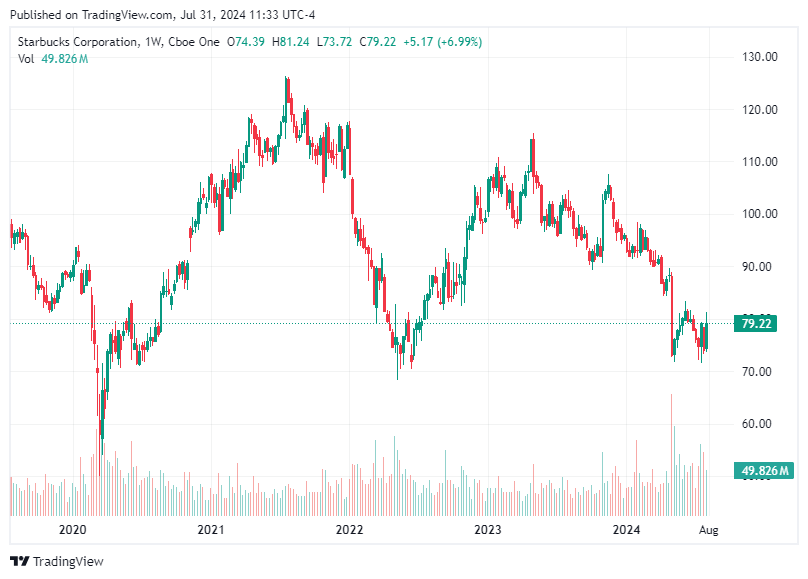Starbucks Reports Declining Sales: Strives For Recovery
Starbucks Aims for Recovery Amid Declining Sales.

Disclaimer: This article is intended for informational purposes only. It is based on the latest available data as of July 2024. All opinions expressed in this article are those of the respective authors and do not necessarily reflect the views of Starbucks Corporation or any affiliated entities.
Real-time information is available daily at https://stockregion.net
Starbucks Corporation, a titan in the global coffee industry, is currently grappling with declining sales and a challenging economic environment. The fiscal third quarter has shown a notable dip in performance, prompting the company to take robust measures to regain its footing.
Financial Performance Overview
For the fiscal third quarter, Starbucks reported net income of $1.05 billion, translating to 93 cents per share. This is a decrease from the $1.14 billion, or 99 cents per share, reported in the same quarter last year. Revenue declined by around 1% year over year to $9.11 billion, although this was an improvement from the previous quarter. Same-store sales, a critical metric indicating the performance of stores open for at least one year, fell 3% globally. In the U.S., same-store sales declined by 2%, marking the second consecutive quarter of decreases since the disruptions caused by the Covid-19 pandemic in 2020. Analysts had anticipated adjusted earnings of 93 cents per share on revenue of $9.25 billion, with a same-store sales decline of 2.7%.
Despite these challenges, Starbucks has implemented various operational efficiencies aimed at mitigating the impact of a cautious consumer environment. Chief Executive Laxman Narasimhan expressed optimism, noting that the company's three-part action plan is starting to yield positive results. Chief Financial Officer Rachel Ruggeri highlighted that their efficiency efforts are surpassing expectations, helping to balance the investments required to navigate the current market conditions.
A significant part of Starbucks' strategy involves the Siren system, which encompasses new dispensers, blenders, and other equipment designed to streamline food and beverage preparation processes. This initiative aims to enhance operational efficiency and improve customer service, ultimately driving better financial performance.
Impact of Activist Investor Elliott Investment Management
Following the release of the quarterly results, Starbucks shares rose by 2.2% after hours. However, the stock has experienced a substantial decline of approximately 21% year-to-date. The downturn is attributed to heightened competition and decreased demand both domestically and internationally. Adding a layer of complexity, activist investor Elliott Investment Management has recently acquired a stake in Starbucks. This development has sparked speculation about potential changes, including reduced investment, the sale of the China business, more aggressive share repurchase programs, expedited implementation of the Siren system, and potentially revisiting the company's stance on unionization.
BTIG analyst Peter Saleh commented that such changes could enhance Starbucks' fundamental performance and, consequently, its share price. Starbucks faces several hurdles in the global market, most notably in China. The economic recovery in China has been sluggish, with intense competition from local coffee brewers putting additional pressure on Starbucks. To counter these challenges, the company has introduced new menu items and targeted marketing efforts to attract occasional customers.
In the U.S., rising prices at restaurants have led consumers, particularly those with lower incomes, to reconsider their spending habits. This has prompted fast-food chains to offer more value deals to retain their customer base. McDonald's Corp., for instance, reported that economic pressures on shoppers have intensified and are likely to persist for several quarters.
Unionization Efforts and Labor Relations
Labor relations remain a critical issue for Starbucks, with an increasing number of stores voting to unionize. The company and the union announced earlier this year that they would resume contract discussions. The outcome of these negotiations could influence Starbucks' labor costs and overall operational dynamics.
Starbucks' focus on efficiency and innovation will be pivotal. The successful implementation of the Siren system and other operational improvements could help the company navigate the challenging economic landscape and enhance its competitive edge. Understanding and adapting to changing consumer behavior will also be crucial. As inflation and economic uncertainties continue to shape consumer spending patterns, Starbucks must remain agile in its approach to pricing, product offerings, and marketing strategies.
The involvement of activist investors like Elliott Investment Management could lead to shifts that might impact the company's long-term trajectory. Stakeholder responses to these potential changes will play a role in shaping Starbucks' future.
Starbucks is at a critical juncture as it seeks to recover from declining sales and navigate a complex global economic environment. With a combination of initiatives, operational efficiencies, and potential adjustments influenced by activist investors, the company aims to bolster its performance and regain market confidence.
Disclaimer: The information provided in this article is based on publicly available data and is intended for informational purposes only. It should not be construed as financial or investment advice. Readers are encouraged to conduct their own research and consult with financial advisors before making investment decisions.
Real-time information is available daily at https://stockregion.net


